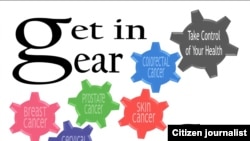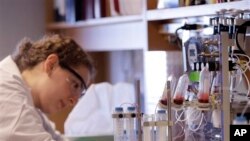HARARE —
Breast cancer survivors, cancer experts and service providers Friday gathered at the Cancer Association in Zimbabwe in Harare to commemorate World Pink Day in recognition of Breast Cancer Month amid revelations that Zimbabwe no longer provides subsidies and free services in its hospitals to treat cancer patients due to lack of funds.
Cancer experts who attended the gathering said breast-feeding helps reduce the risk of one developing breast cancer and that one in a thousand men have a chance of developing breast cancer.
Oncologist Nomsa Tsikayi emphasised the importance of early detection saying breast cancer is treatable if detected early.
“Having menstrual periods early before the age of 12 years also increases one’s risk. Having menopause late after the age of 55 years of age, one has to be aware of the fact that that increases the risk of developing breast cancer. Having a child late after the age of 30, not breastfeeding, being overweight especially post-menopausal obesity, previous history of breast cancer and use of artificial hormones such as the hormone replacement therapy were also found to increase one’s risk of developing breast cancer,” said Tsikayi.
Beer drinking and smoking are some of the high risk factors that Tsikayi said can lead to one developing breast cancer among women.
According to Tsikayi, personal lifestyle that includes good eating habits, taking foods low in fats, exercising regularly and exclusive breastfeeding help in reducing the risk of developing breast cancer.
She added that government is currently unable to treat cancer patients who cannot afford to pay high medical expenses.
“So they do somehow have a social welfare department that can check to see if one patient can afford or not to pay for treatment. They do a lot of vetting. But still you find even after the vetting process, the drugs are not available at Parirenyatwa Hospital and the patient has to go and buy from a private pharmacy.
"A lot of patients end up going home untreated unfortunately. So there is a lot that needs to be done, whether it’s a message to NGOs, the government … This is a big problem,” said Tsikayi.
Gladys Fainoza, a 45 year-old Horseshoe Primary School teacher in Mashonaland Central, who was diagnosed of suffering from cancer six years ago, was among breast cancer survivors who attended the Friday event.
Fainoza encouraged fellow women to go for breast cancer screening for early detection, which she said played a critical role in saving her life.
“Early detection saves life. They have to go for screening. They must not be afraid of anything that they don’t know. They should go and talk to the doctors, once they get the screening, if it is positive it is fine, if it is negative they should seek medical attention, proper medical attention,” she said.
She said family members and spouses in particular should provide enough support for cancer patients when faced with this life threatening condition.
Junior Mavhu of the Cancer Association in Zimbabwe also encouraged cancer survivors to soldier-on in their fight against breast cancer.
“Our soldiers, survivors, please keep the fight going and encourage those that have not been checked to go for testing because you’ve been through the journey already. We are doing cervical cancer screening and this month it is half the usual price. So you have to get your breast examined and you get cervical cancer tested just for half the stipulated price,” said Mavhu.
Cancer experts say 97 percent of those with cancer detected early manage to live for at least five years.
They argue that the majority of breast cancer patients normally reveal their status at a very advanced stage when nothing can be done to take them through the treatment process.
Breast cancer is believed to be the second most common type of cancer among non-black Zimbabweans.
Cancer experts who attended the gathering said breast-feeding helps reduce the risk of one developing breast cancer and that one in a thousand men have a chance of developing breast cancer.
Oncologist Nomsa Tsikayi emphasised the importance of early detection saying breast cancer is treatable if detected early.
“Having menstrual periods early before the age of 12 years also increases one’s risk. Having menopause late after the age of 55 years of age, one has to be aware of the fact that that increases the risk of developing breast cancer. Having a child late after the age of 30, not breastfeeding, being overweight especially post-menopausal obesity, previous history of breast cancer and use of artificial hormones such as the hormone replacement therapy were also found to increase one’s risk of developing breast cancer,” said Tsikayi.
Beer drinking and smoking are some of the high risk factors that Tsikayi said can lead to one developing breast cancer among women.
According to Tsikayi, personal lifestyle that includes good eating habits, taking foods low in fats, exercising regularly and exclusive breastfeeding help in reducing the risk of developing breast cancer.
She added that government is currently unable to treat cancer patients who cannot afford to pay high medical expenses.
“So they do somehow have a social welfare department that can check to see if one patient can afford or not to pay for treatment. They do a lot of vetting. But still you find even after the vetting process, the drugs are not available at Parirenyatwa Hospital and the patient has to go and buy from a private pharmacy.
"A lot of patients end up going home untreated unfortunately. So there is a lot that needs to be done, whether it’s a message to NGOs, the government … This is a big problem,” said Tsikayi.
Gladys Fainoza, a 45 year-old Horseshoe Primary School teacher in Mashonaland Central, who was diagnosed of suffering from cancer six years ago, was among breast cancer survivors who attended the Friday event.
Fainoza encouraged fellow women to go for breast cancer screening for early detection, which she said played a critical role in saving her life.
“Early detection saves life. They have to go for screening. They must not be afraid of anything that they don’t know. They should go and talk to the doctors, once they get the screening, if it is positive it is fine, if it is negative they should seek medical attention, proper medical attention,” she said.
She said family members and spouses in particular should provide enough support for cancer patients when faced with this life threatening condition.
Junior Mavhu of the Cancer Association in Zimbabwe also encouraged cancer survivors to soldier-on in their fight against breast cancer.
“Our soldiers, survivors, please keep the fight going and encourage those that have not been checked to go for testing because you’ve been through the journey already. We are doing cervical cancer screening and this month it is half the usual price. So you have to get your breast examined and you get cervical cancer tested just for half the stipulated price,” said Mavhu.
Cancer experts say 97 percent of those with cancer detected early manage to live for at least five years.
They argue that the majority of breast cancer patients normally reveal their status at a very advanced stage when nothing can be done to take them through the treatment process.
Breast cancer is believed to be the second most common type of cancer among non-black Zimbabweans.






